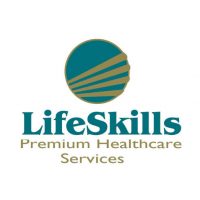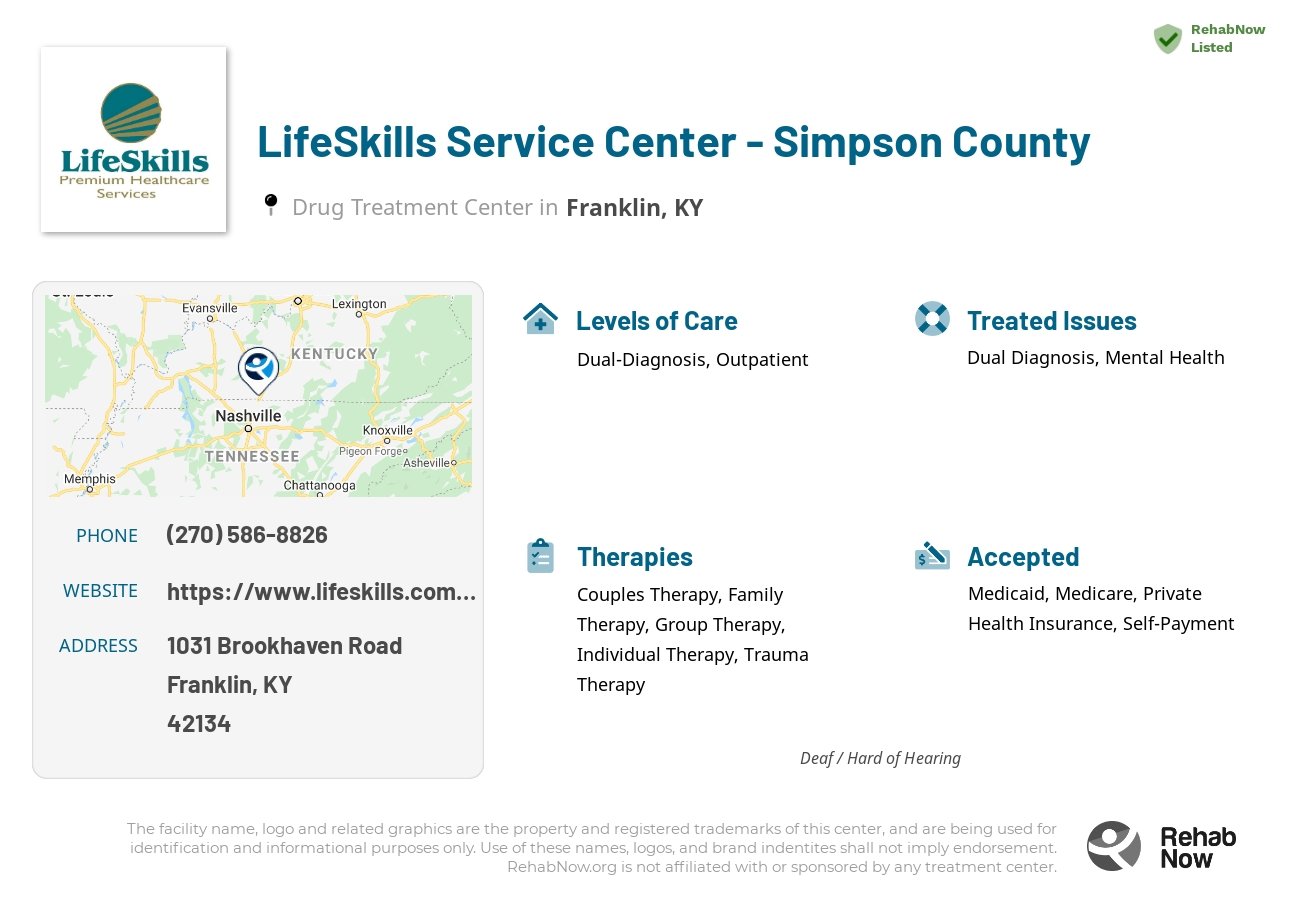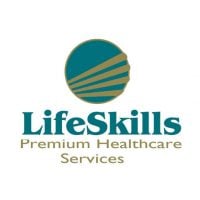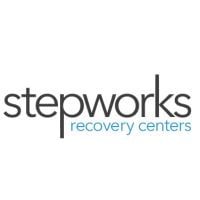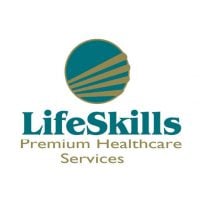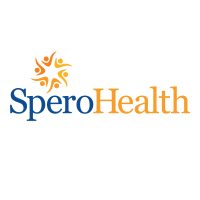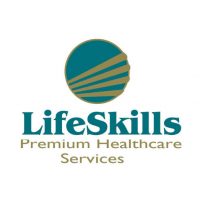LifeSkills Service Center - Simpson County
Drug Rehab Center in Franklin, Kentucky
LifeSkills Service Center - Simpson County in Franklin, Kentucky is a dual-diagnosis outpatient, inpatient, and detox treatment center offering personalized care for mental health and addiction issues such as alcohol abuse, opioid addiction, and drug addiction, with specialized therapies and aftercare services available.
About LifeSkills Service Center - Simpson County in Kentucky
LifeSkills Service Center – Simpson County, nestled in Franklin, Kentucky, is a private rehabilitation facility focusing on dual diagnosis and mental health. It sets itself apart by offering a comprehensive array of services aimed at addressing both addiction and underlying mental health issues, promising personalized treatment plans for individuals and families.
This center is not only state-licensed but also widely recognized for its high-quality care and is accepted by most private health insurance providers. LifeSkills offers a blend of inpatient, outpatient, and detox treatments tailored to the unique needs of each client, ensuring a holistic approach to recovery.
- Specializes in dual diagnosis, helping clients tackle both addiction and concurrent mental health issues.
- Offers a range of therapeutic modalities including Individual, Group, and Couples Therapy for a tailored treatment experience.
- Provides comprehensive aftercare and discharge planning to support clients in their journey towards long-term sobriety.
LifeSkills Service Center is adept at treating a variety of addictions and issues, including alcohol abuse, opioid addiction, and drug addiction, among others. Treatment methods encompass a mix of Dialectical Behavioral Therapy, Cognitive Behavioral Treatment, Motivational Interviewing, and more, delivered across different levels of care to match client needs.
Genders
Ages
Modality
Additional
Accreditations
State License
Conditions and Issues Treated
Treatment for opioid addiction is best made with the help of medical professionals who are experienced in dealing with these types of drugs. This treatment can involve medications, exercise, behavioral therapy, and counseling sessions. It is important to note that the effectiveness of treatments for opioid addiction vary, so it is vital to research which treatment options are suitable for each individual.
Many people who struggle with opioid addiction need to attend specific programs like methadone , Suboxone or Vivitrol clinics.
These types of programs will provide the patient with legal, prescription medications that can help them overcome their cravings for illegal opioids like heroin or fentanyl . If the patient has a chronic condition like Hepatitis C, they must undergo treatment before they can begin taking these medications.
Individuals who are addicted to drugs and/or alcohol often have one or more co-occurring mental health disorders. Addressing both the addiction and the mental health problems at facilities like LifeSkills Service Center - Simpson County can be very beneficial for these individuals.
Common mental health conditions that often co-occur with addiction include:
- Anxiety Disorders – People with drug and alcohol problems often suffer from anxiety disorders such as panic disorder, obsessive-compulsive disorder, social anxiety disorder, and generalized anxiety disorder.
- Depression – One of the most common mental illnesses co-occurring with addiction is major depressive disorder.
- Attention-deficit hyperactivity disorder (ADHD) – Many people with drug and alcohol problems also suffer from ADHD.
- Bipolar Disorder – People with bipolar disorder are more likely to suffer from drug and alcohol problems than the general population, and vice versa.
Levels of Care Offered
This center offers a variety of custom treatment tailored to individual recovery. Currently available are Aftercare Support, Detox, Dual-Diagnosis, Inpatient, Outpatient, with additional therapies available as listed below.
Detox is the stage of recovery where the drugs or alcohol are entirely removed from your body. There are two different ways to detox, with medications and without. For many drugs and alcohol, the acute phase of detox can be completed in a number of days.
Inpatient recovery offers individual therapy, groups, and family therapy. The length of inpatient addiction treatment depends on the addict and their addiction. Inpatient rehab is a costly drug treatment, costing anywhere from $30k- to $60k. However, insurance often offers help in covering these costs.
Outpatient treatment can be considered the lowest intensity level of addiction treatment in Franklin, KY. It is ideal for early phase addiction or lower intensity addictions. LifeSkills Service Center - Simpson County peer group support, 12-step programs, and individual counseling are likely to be involved.
Aftercare support is vital to those who have completed a drug or alcohol treatment program. This support comes in individual and family counseling, treatment of psychiatric and other medical conditions, and medications to reduce cravings. It helps recovering addicts adjust to normal day-to-day activities and can last for a year or longer.
The majority of drug and alcohol addicts who receive aftercare treatment do not relapse. It is estimated that without aftercare, the relapse rate will be between 70 to 90 percent for most people. Aftercare is the final stage in addiction recovery, but it will also help maintain sobriety if relapse does occur.
Therapies & Programs
Individual therapy is ideal for addicts who want to focus on themselves. It can also be helpful for those whose withdrawal symptoms are exacerbated by the presence of other people.
Benefits of individual therapy are:
- Access to a personalized treatment plan that focuses on the individual needs of the addict
- More privacy during treatment sessions
- Better personal development through introspection
- Increased self-awareness regarding addictive tendencies in order to avoid relapse
- Greater potential for a long-term recovery plan
- Receiving professional advice and detox assistance from medical staff
Couples therapy is a treatment method used to help couples in which at least one member of the couple has a drug addiction. Couples therapy can be used whether the addicted partner is using drugs or in recovery. An additional benefit of couples therapy is that it can help make other types of treatment, such as 12-step programs, more effective.
Family therapy can help you and your family deal with old issues that may trigger substance abuse. The idea behind family therapy for drug addiction is that you are never fully healed from substance abuse until you’ve healed your relationship with your family, too. To get sober, you need to find a different way to cope with the pain in your life.
This is when a group of people in various stages of recovery meet up and discuss their experiences, triggers, successes, failures, and even alternative therapies! Unlike support groups where everyone already knows each other, group therapy is conducted along side outpatient or inpatient treatment at LifeSkills Service Center - Simpson County.
Trauma therapy is a clinical process that helps individuals deal with mental stress often caused by traumatic events. The therapist helps the person identify, understand and work through the problem. This is done with the help of talking about it in group or one-on-one counseling sessions.
Therapists use relaxation, role-playing, art, and music to help the person open up about what is bothering them. Some examples include:
- Talking about the traumatic event and how it affected them.
- Helping those who have PTSD to deal with their nightmares and recurring memories.
- Working with individuals to resolve the issues triggering the stress, whether seeing someone who reminds them of what happened or feeling helpless.
The individual is also encouraged to help others that are struggling with similar problems. This often helps them feel empowered and gives them hope.
Trauma therapy is not for everyone; it is usually reserved for people who have recently experienced a traumatic event and struggle to get over it. It is generally done for children, teenage victims of sexual assault, and war veterans.
Dialectical Behavior Therapy (DBT) is used by drug treatment centers across the United States to help drug addicts become sober. DBT is a type of Cognitive Behavioral Therapy (CBT) that combines traditional behavioral treatments with elements from DBT, including dialectics, distress tolerance, and interlocking issues. Some of the negative behaviors associated with addiction, such as impulsivity and mood swings, are addressed in DBT, while others like craving and isolation are not. It is commonly used to treat Borderline Personality Disorder (BPD) along with substance abuse disorders.
The four DBT modules are mindfulness, interpersonal effectiveness, emotion regulation, and distress tolerance:
- Mindfulness helps recovering addicts learn to identify and experience their emotions while realizing that they are not permanent.
- Interpersonal Effectiveness includes assertiveness, asking for what you need, and saying no while improving communication skills.
- Distress Tolerance has recovering addicts learn how to tolerate distress at the moment and avoid resorting to substance abuse.
- Emotion Regulation is used to identify, express and change emotions.
CBT is a psychotherapy approach and method. [ws-nap-name] people to examine how their thoughts, including habitual harmful and inaccurate thinking, affect their actions. CBT is based on the idea that rigid, inflexible thinking leads to poor stress management, which leads to emotional distress.
Similarly, CBT helps people identify and change negative behaviors. It makes you question your perceptions and ask if they are realistic. CBT asks people to examine their behaviors and emotional responses and how they affect their lives. CBT aims to change people’s thinking and behavior to lead a more balanced and healthy life.
Moreover, CBT has been shown to reduce anxiety disorders, depression, and symptoms associated with harmful thoughts or actions.
Those struggling with addiction can benefit from learning certain life skills. It is not as simple as quitting drinking or taking drugs and thinking that the hard part is over. Being sober means living a whole new way of life. Many recovering addicts have found that they need to develop talents like time management, organization, communication skills, socialization skills, and self-esteem to make their life in sobriety work, LifeSkills Service Center - Simpson County is here to help with that.
Payment Options Accepted
For specific insurance or payment methods please contact us.
Is your insurance accepted?
Ask an expert, call (888) 674-0062
LifeSkills Associated Centers
Discover treatment facilities under the same provider.
- LifeSkills - Edmonson County Office in Brownsville, KY
- LifeSkills - Monroe County in Tompkinsville, KY
- LifeSkills - Barren County Office in Glasgow, KY
- LifeSkills Service Center and Friendship Clubhouse - Barren County in Glasgow, KY
- LifeSkills - Simpson County Office in Franklin, KY
Learn More About LifeSkills Centers
Additional Details
Specifics, location, and helpful extra information.
Franklin, Kentucky 42134 Phone Number(270) 586-8826 Meta DetailsUpdated April 15, 2024
Staff Verified
LifeSkills Service Center - Simpson County Patient Reviews
There are no reviews yet. Be the first one to write one.
Franklin, Kentucky Addiction Information
Kentucky ranks among the top ten states for opioid-related overdoses. Most of these are due to heroin, fentanyl, and prescription opioid use. A little over 11% of the Kentucky population abuses alcohol in a given year. More than 15% of Kentucky adults admit to participating in binge drinking every month.
The drug addiction problem in Franklin, KY, is relatively bad. There were over 1,000 admissions to substance abuse treatment facilities in Franklin County in 2012. There have also been increases in crime rates and the number of people addicted to drugs. Many different types of drug and alcohol rehab facilities are available in Franklin, KY. The most common types of treatment include inpatient rehab, outpatient rehab, and 12-step programs.
Treatment in Nearby Cities
- Lancaster, KY (127.1 mi.)
- Stanton, KY (169.2 mi.)
- Bellevue, KY (202.0 mi.)
- Owensboro, KY (79.8 mi.)
- Lawrenceburg, KY (130.6 mi.)
Centers near LifeSkills Service Center - Simpson County
The facility name, logo and brand are the property and registered trademarks of LifeSkills Service Center - Simpson County, and are being used for identification and informational purposes only. Use of these names, logos and brands shall not imply endorsement. RehabNow.org is not affiliated with or sponsored by LifeSkills Service Center - Simpson County.
